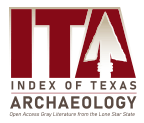Home > Research Projects and Centers > Center for Regional Heritage Research > Index of Texas Archaeology > Vol.
Agency
Texas Historical Commission
Abstract
AECOM Technical Services, Inc. (AECOM) conducted an intensive archaeological survey for the proposed San Antonio Water System (SAWS) W-1 Leon Creek Sewer Main Improvement Project (project). Initially, the project spanned approximately 3.9-miles from State Highway 151 to United States Highway 90, in west San Antonio, Bexar County, Texas. In 2017, the project alignment was split into 2 segments: Segment 1 (northern half) and Segment 2 (southern half). Segment 2 of the alignment was re-evaluated in 2018, which resulted in approximately 1.1-miles of alignment which was not previously surveyed. Project construction will include the installation of an 84-inch diameter wastewater sewer main, to be installed parallel to the existing undersized 42-inch wastewater sewer main. The existing sewer main may be abandoned in-place. Construction will be located within or adjacent to an existing 50-foot wide SAWS easement. A proposed construction easement (approximately 100-feet in width) and a temporary construction easement (approximately 25-feet in width) are also included within the project area.
Because Section 404 permitting or a Nationwide Permit 12 is required, the project constitutes a federal undertaking requiring compliance with Section 106 of the National Historic Preservation Act of 1966, as amended. In addition, portions of the project are on land owned by the City of San Antonio (CoSA); therefore the project falls within the purview of the Antiquities Code of Texas, which requires review by the Texas Historical Commission. Furthermore, since the project is located within the city limits, the survey was also conducted in compliance with historic preservation provisions of the CoSA’s Unified Development Code.
AECOM archaeologists conducted the initial archaeological survey of the project between May 25, 2016, and June 8, 2016, under Texas Antiquities Permit No. 7632. The investigation included a pedestrian survey and the excavation of 57 shovel tests, all of which failed to identify any cultural resources sites. Numerous disturbances, particularly from gravel quarrying and previous sewer line installations, were observed, which precluded the presence of any intact sites. Segment 2, which was developed much later over the course of the project, was surveyed on September 26, 2018. Pedestrian survey and the excavation of 10 shovel tests failed to yield cultural materials. Since no artifacts were identified or collected during the survey, only records will be curated at the Center for Archaeological Research, the University of Texas at San Antonio.
During the survey, shovel tests, cut bank profiles, and fluvial-morphological observations revealed the Leon Creek floodplain consists of a recently-constructed (historic/ modern) alluvial deposit. The presence of imbricated gravel layers within the loamy floodplain soils, along with reworked sediments, gravel bars, and numerous bedrock scours indicates this portion of the stream is subject to periodic, high-energy flooding, with little potential to contain deeply buried and intact sites. As such, no deep mechanic trenching was warranted.
Based on the survey results, it is recommended that construction of the project would have No Effect on any archaeological historic properties, State Antiquities Landmarks, or historic structures. Therefore, no further archaeological investigations are recommended. However, should the project alignment change, additional archaeological investigations may be necessary.
Creative Commons License

This work is licensed under a Creative Commons Attribution-NonCommercial 4.0 International License
Included in
American Material Culture Commons, Archaeological Anthropology Commons, Environmental Studies Commons, Other American Studies Commons, Other Arts and Humanities Commons, Other History of Art, Architecture, and Archaeology Commons, United States History Commons
Submission Location
Tell us how this article helped you.


